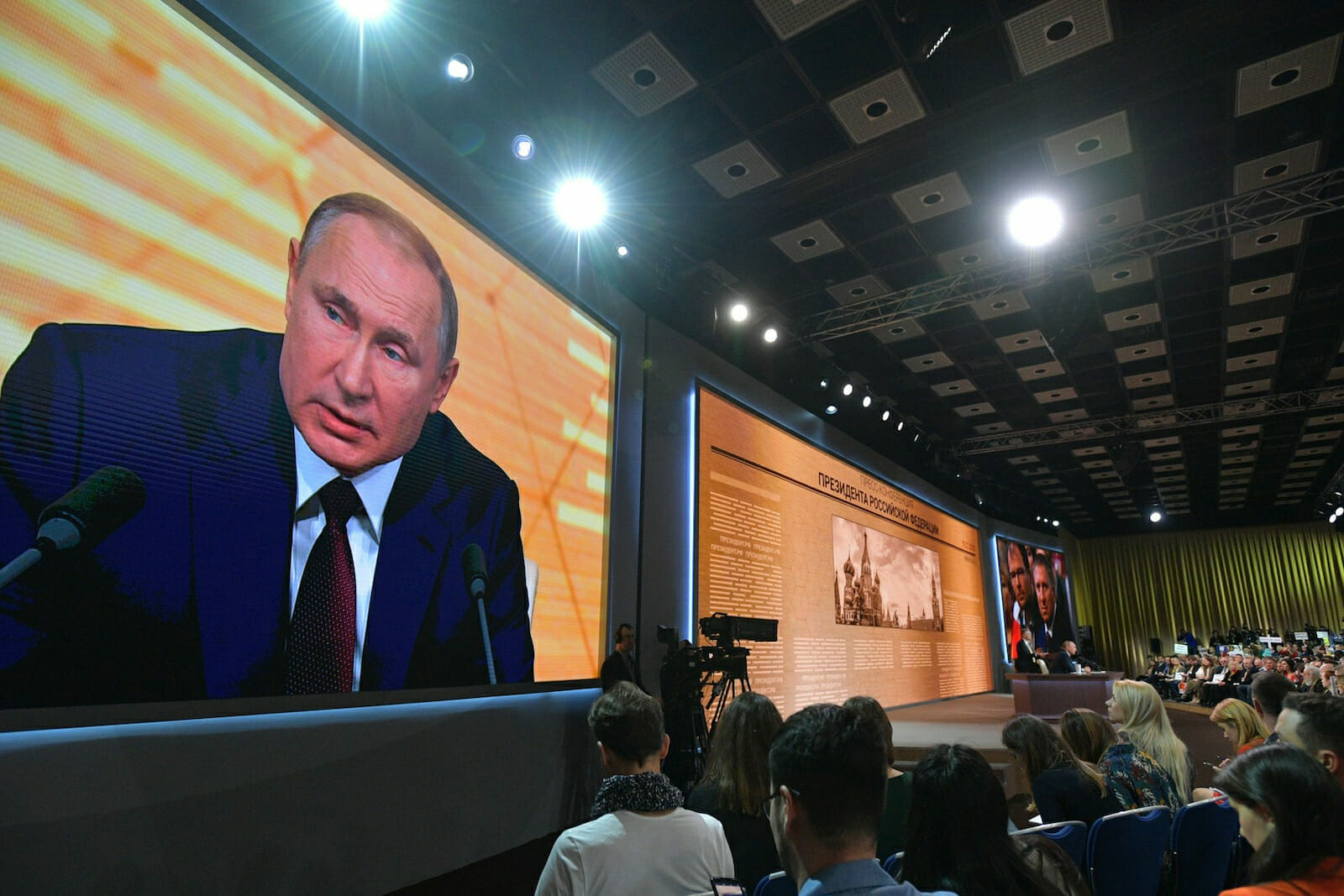
Putin’s Narrative of NATO is Problematic
For much of his career as president of Russia, Vladimir Putin has been an outspoken critic of NATO. Putin has been propagating the misguided narrative that NATO is causing insecurity and instability throughout the region. On the contrary, Russian aggression has destabilized the North Atlantic, and Putin is using anti-NATO rhetoric to justify it. In addition to invading Georgia in 2008 and Ukraine in 2014, Russia has recently undertaken a wide range of political warfare tactics against the West, including election interference, cyberattacks, and disinformation and propaganda campaigns.
Putin’s scathing narrative of NATO describes the Alliance as a threat to Russia and harmful to global security, which is helping sow doubt among NATO members, reduce confidence in the Alliance, and create more NATO skeptics. However, NATO members must not buy the false narrative that NATO is attempting to undermine Russia, as it is only a diversion. By falling under the influence of Putin’s narrative, Western policymakers risk rationalizing Russia’s increasingly aggressive behavior. In addition to rejecting Putin’s claims, the Alliance must foster a more positive and cooperative relationship with Russia because, if left in the dark, Putin will persist in attempting to undermine NATO through his combative rhetoric.
NATO-Russia relations were relatively cordial after the end of the Cold War but began to waver in the early 2000s. Russia’s hostility toward the West developed after various events such as the Iraq War, the color revolutions in Georgia and Ukraine, and the United States’ development of Ballistic Missile Defense (BMD) capabilities in Central Europe. All of this, along with NATO’s fifth round of enlargement in 2004 that welcomed seven more countries into the Alliance, fueled Putin’s paranoia that NATO was plotting a regime change in Russia.
Putin’s speech to the Munich Security Conference in February 2007 was one of his first public displays of discontent with the West in general and NATO in particular. Putin alleged that the West’s so-called “uncontained hyper use of force” has created a state of perpetual conflict and he suggested that the West, led by the United States, is striving for supremacy in a unipolar world. He then went on to express his concern over NATO’s eastward expansion and stationing of forces near Russian borders, contending that these activities are provocative and reduce mutual trust.
Putin’s criticisms of NATO immediately had significant policy implications. During NATO’s Bucharest Summit in April 2008, some members gave Putin hope that his concerns regarding NATO and the West were valid. Germany and France vetoed the option to offer Ukraine and Georgia Membership Action Plans (MAPs), hoping that this would help prevent Russian hostility and a disruption in the balance of power between Russia and Europe. Only four months later, Russia seized the opportunity to assert itself upon Georgia. In August 2008, Russian forces occupied 20% of Georgia’s territory, igniting the five-day Russo-Georgian War. Hesitant to provoke Putin, NATO emboldened Russia to act aggressively toward Georgia.
As time went on, Putin stepped-up Russian aggression in tandem with his anti-NATO rhetoric. In February 2014, Russian military forces took over the Ukrainian peninsula of Crimea, following a U.S.-encouraged coup in Ukraine that put a pro-Western government into power. During a speech that March, Putin provided justification for Russia’s annexation of Crimea by shifting the blame to NATO. He asserted that Russia perceived the coup, alongside sustained NATO enlargement, as a hostile move against Russia, framing Russia’s action as simply a reaction to the West seemingly aligning against it. The realist perspective suggests that Russia felt threatened by NATO expansion and therefore reacted in self-defense.
In reality, however, Putin should not be threatened by NATO and its expansion; NATO is neither attempting to overthrow Putin nor does it pose a military threat to Russia. In fact, NATO made several attempts to reassure Russia during the expansion process. For example, the NATO-Russia Founding Act of 1997 created a strategic partnership between NATO and Russia and limited the nuclear weapons and combat forces deployed within the territories of new NATO member states. Furthermore, the NATO-Russia Council established in 2002 facilitated NATO-Russia cooperation on a variety of issues including counterterrorism and arms control. Although these efforts were temporarily successful in quelling Russia’s paranoia, Putin has since used NATO expansion as an excuse for Russian aggression against aspiring NATO members.
Ironically, Putin benefits from the stability created by NATO. For example, NATO members in Russia’s neighborhood, especially the Baltic States, rest easy knowing that the Alliance will come to their protection against Russian aggression if necessary, under Article 5 of the North Atlantic Treaty. Russian forces invaded Georgia and Ukraine because Putin knew that the neighboring NATO members would feel secure enough to not retaliate. Hence, Russia’s military aggression was the destabilizing factor in these situations, not NATO.
In light of the ongoing NATO reflection process, NATO 2030, NATO must work to facilitate a better relationship with Russia, like it previously had after the Cold War. Putin has claimed that Russia is open to cooperation with NATO, so the Alliance should take advantage of Putin’s invitation and work together on shared interests. Since Putin recognizes that terrorism is a common threat to Russia and NATO members, NATO should reengage Russia in its counterterrorism efforts. Doing so might quiet Putin’s negative rhetoric and prove to him that NATO is, in fact, not hostile toward Russia.
Although membership for Georgia and Ukraine is unlikely in the near future, NATO should help strengthen these countries’ defense capabilities by providing resources and training to counter Russian aggression in all of its forms. Similarly, current members must expand their abilities to thwart Russia’s hybrid warfare schemes. It is in NATO’s interest to avoid escalating tensions with Russia, but the Alliance must make Russia understand that it will no longer tolerate neither Russia’s aggressive behavior nor Putin’s fictitious narrative of NATO.
Putin falsely portrays NATO as a threatening, conflict-creating, regime-changing entity in the attempt to reduce confidence in the Alliance and divert attention away from the aggressive, destabilizing activities undertaken by Russia. Putin’s unfounded criticisms of NATO are continually used to justify Russian aggression, as demonstrated in the Georgia and Ukraine crises. NATO must help the world understand that Putin’s finger-pointing is merely a political ploy.
As Russia continues to modernize its military and grow in influence, NATO must remain committed to its purpose and unapologetic in its endeavors. Allies need to recall the value of the Alliance and its contributions to security and stability, especially for its members. NATO is neither a threat to Russia nor to global security. Rather, NATO works to create a more secure region in the face of an aggressive Russia and other security threats. Putin’s narrative of NATO is problematic, and the Alliance must push back and continue to carry out its mission.
